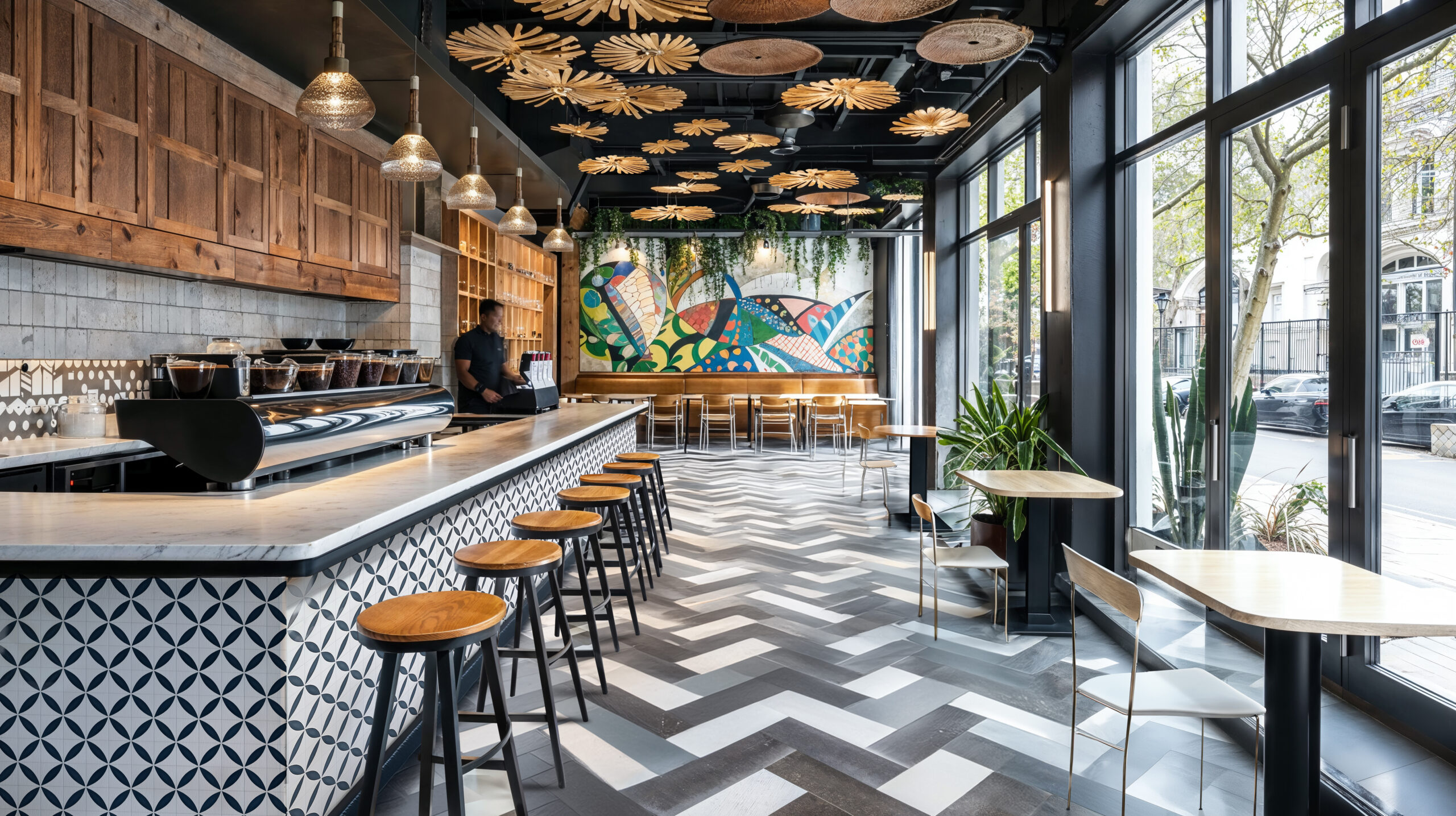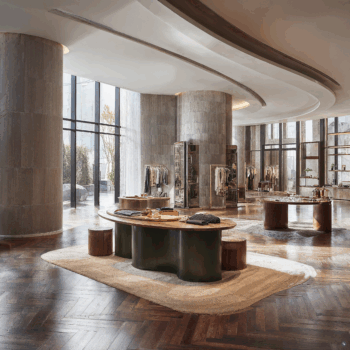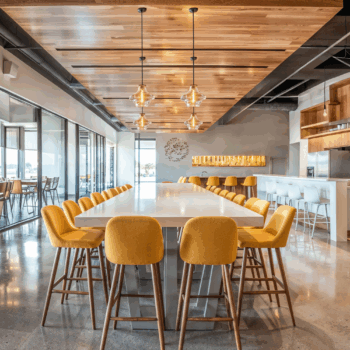
Coffee shops have evolved far beyond the place for a quick caffeine fix. They’ve become a haven for freelancers, remote employees, and digital nomads seeking comfort, connectivity, and inspiration. The rise of remote work has created a unique opportunity for café owners to cater specifically to the “work from anywhere” set, transforming the corner booth into a productivity hub. Unique materials, thoughtful layouts, and functional finishes make all the difference in creating a desirable environment.
With the flexibility of “work from anywhere”, remote employees seek out spaces that foster connection and creativity while delivering comfort and aesthetic appeal. For many, the traditional office has been replaced by a corner table in their favorite café. The hum of conversation, ambient music, and the smell of freshly brewed coffee provide a stimulating atmosphere that allows them to focus while still connecting with other people.
As coffee shops recognize this shift, design strategies have adjusted focus to creating a balance between a lively café and a functional workspace. The challenge is to maintain the shop’s welcoming vibe while incorporating the elements that remote workers need—power outlets, Wi-Fi, comfortable seating, and well-planned lighting.
Mixed seating options like elongated tables, individual desks, and cozy nooks support a variety of work. Large communal tables foster collaboration, while quiet corners offer privacy for focused tasks or virtual meetings. Sectioning off areas with low partitions or plants can subtly separate spaces without closing off the room, keeping the space open and airy. Incorporating flexible furniture, like movable tables and chairs, can help accommodate various working styles while still catering to clients grabbing a quick cup of coffee.
The right materials enhance the design and set the tone for a productive environment. Reclaimed wood tabletops add warmth and character, giving the space a welcoming, rustic feel that can encourage creativity. Paired with polished concrete floors, this combination creates a modern yet grounded aesthetic. Concrete is durable, easy to clean, and can be softened with rugs or padded seating areas for extra comfort. Quartz countertops at the coffee bar provide a sleek, durable surface that withstands spills and daily wear, while maintaining a polished look. Incorporating brushed brass or matte black steel for accents—such as light fixtures, door handles, or furniture frames—can create a modern industrial look that appeals to today’s minimalist aesthetic.
Lighting plays a critical role in any workspace. Natural light is a priority, as it not only enhances mood and productivity but also reduces eye strain for those staring at screens. Large windows, skylights, or even a glass storefront can flood the space with sunlight, creating an uplifting environment. For evening workers or on overcast days, use a combination of ambient lighting, such as pendant lights or chandeliers, and task lighting, like adjustable sconces, at individual tables. LED strip lighting beneath shelves or around key seating areas can provide subtle illumination that enhances the atmosphere without being harsh.
Coffee shops are inherently busy, and while a bit of ambient noise can be motivating, excessive chatter or loud background music can be distracting. Acoustic panels made from materials like felt or cork help to absorb sound and create a quieter, more focused space. These panels can be integrated into walls, ceilings, or even as dividers between seating areas. Consider custom-designed acoustic panels that reflect the café’s brand or style. For example, large-scale geometric felt installations or nature-inspired designs not only absorb sound but also add visual interest.
Incorporating biophilic design enhances productivity and reduces stress. Live plants, vertical gardens, or even small planters on each table can make the space feel more vibrant and calming. Not only do plants improve air quality, but they also create a sense of tranquility, which can be especially helpful for remote employees balancing multiple tasks and deadlines. Using natural materials like stone for countertops or flooring, or even incorporating living walls, adds texture and reinforces this connection to nature. A green palette mixed with earthy tones and wooden accents fosters an environment where workers feel grounded and focused.
No modern worker can function without reliable Wi-Fi and accessible power outlets. Ensure that each table or seating area has easy-to-access outlets or provide wireless charging stations integrated into tables and countertops. Some cafés even offer USB charging ports embedded in the walls or furniture, eliminating the need for bulky adapters. These conveniences can keep remote workers tethered to the space longer, as they’ll be less likely to relocate when their devices run low on battery.
When designing for remote workers, the details make all the difference. High-quality finishes that balance durability and aesthetics elevate the café’s atmosphere and provide long-term functionality. Matte finishes on furniture prevent glare from laptop screens, while stain-resistant fabrics ensure that seating areas remain pristine, even with heavy use. Similarly, non-slip, easy-to-clean flooring, such as vinyl or porcelain tile, can handle the high foot traffic of a busy café while offering a polished, professional look.
As remote work continues to grow, coffee shops have the opportunity to establish themselves as go-to workspaces for a new breed of professionals. By thoughtfully incorporating unique materials, purposeful layouts, and modern design elements, café owners can create spaces that not only encourage productivity but also elevate the customer experience. Coffee shops are no longer just a place to grab a latte—they’re becoming the modern workplace, one thoughtfully designed table at a time.
Read more about acoustical solutions in Taming Workplace Noise.







